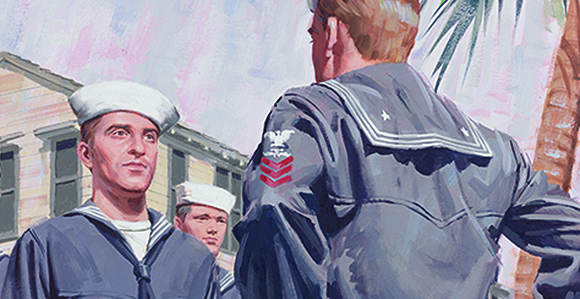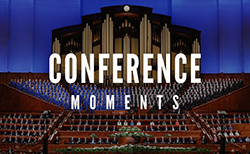Conference Moment: Being “A Man of Character” Even When It Isn’t Popular
Contributed By the Church News

A sailor is depicted standing alone in the face of adversity. Elder Hugh B. Brown recounted in a general conference address how one soldier’s courage to be true to his values led to blessings later on.
“Gentlemen, if I must be untrue to my ideals and my people and do things that I have been instructed all my life I should not do, I’ll quit the army.” —young Mormon boy from President Brown’s talk
In the April 1969 general conference, President Hugh B. Brown, then First Counselor in the First Presidency, shared this story of a young Latter-day Saint man he met while serving in the Canadian army during World War I.
“While I was in training, a young Mormon boy came into the camp. He was awkward. He was not educated very well. But he was a young Mormon boy who had been taught to live the gospel.
“After one parade, when he had gone through everything backwards, he was called by the captain to come into his office. The captain said, ‘I have noticed you, young fellow. You are from Cardston, aren’t you?’
“He said, ‘Yes, sir.’
“‘You are a Mormon, I suppose.’

“‘Yes, sir.’
“‘Well, I just wanted to make friends with you. Will you have a glass of beer?’
“‘Sir, I do not drink liquor.’
“The captain said, ‘The ---- you don’t. Maybe you will have a cigar then.’
“He said, ‘Thank you, sir, but I do not smoke.’
“The captain seemed much annoyed by this, and he dismissed the boy from the room.
“When the young man went back to his quarters, some of the lesser officers accosted him angrily and said, ‘You fool, don’t you realize the captain was trying to make a friend of you, and you insulted him to his face?’
“The young Mormon boy answered, ‘Gentlemen, if I must be untrue to my ideals and my people and do things that I have been instructed all my life I should not do, I’ll quit the army.’ …
“Well, that young man, while overseas later on in the war, was sent for by his captain, who had become a lieutenant colonel, in response to a call from general headquarters for the best man he had in his battalion.
“They had a special mission for him to perform. They said, ‘We don’t care anything about his education or his training. We want a man who can’t be broken when put under test. We want a man of character.’ The lieutenant colonel, his former captain, selected and assigned this young man who had the courage to stand before him and say, ‘I do not smoke. I do not drink’” (in Conference Report, Apr. 1969, 111–13).
